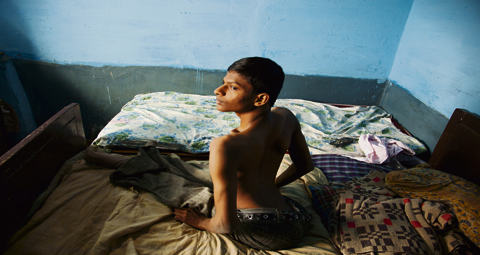BY Ian Dunn | March 23 2012 | ![]() 0 COMMENTS
0 COMMENTS ![]() print
print

Facing the future with hope
Publication Date: 2012-03-23
In the final report from his visit to India with SCIAF, IAN DUNN tells how the charity’s partner organisation, the Association for People with Disabilities, is helping the people there to lead successful lives
The city of Bangalore in southern India is a boomtown. From all over the world companies come here to set up shop, attracted by its balmy climate and vast English speaking, well-educated work force. Walking past the gleaming new skyscrapers and plush shops in the city centre it would be easy to imagine that this is a land of glorious unstoppable opportunity. But this huge economic growth does not appear out of nowhere, it grows from the blood and effort of its people, such as men like Riyaz Ahmed, a Muslim in his late 30s.
I met Riyaz in his small two-room house in a Bangalore slum where he lives with his mother, his wife and their three children.
Two of his children, Nonorentaj, a girl who is 10, and Mohammed, a boy of 8, are deaf.
“I come from a place called Kohla,” he said. “There I have a small business selling tea powder, I travel three hours each day there and back to continue it.”
The reason he makes that journey each day as opposed to moving closer to his work is because the small house he currently lives in with his family is but a short work from the main campus of the Association for People with Disabilities, where the both Nonorentaj and Mohammed attend school.
“In Kohla the teachers told us about this place,” he said. “It is difficult traveling back every day but it is the only way. The difference APD has made to the children is very large. Thank God they are now enjoying success.”
With deaf children he explained, it can be very hard for the parents.
“Parents and children have ways of communicating that are not language but it can still be very frustrating for us and them,” he said. “But since they came to APD they have received hearing aids and learned sign language, they show so much patience with them it has had a huge impact and we can see it in them.”
The benefits provided by APD have given hope for his children’s future.
“You always have hopes for your children,” he said. “It is difficult having deaf children, but look, God is helping the children, they are APD and they are happy. They are a blessing.”
Association for People with Disabilities
The lengths Riyaz is willing to go to have his children attend APD speaks to the extraordinary quality of the work the organisation does. In additional to the charming small school which has 185 children enrolled, the campus also has extensive further vocational training for older children and several other centres in and around the city.
In total, the charity helps nearly 6500 people become more economically independent through their through livelihood programme.
Again and again, speaking to people at APD you hear the mantra of ‘independence, independence, independence.’ Despite the physical challenges they face, many of them have a work ethic and a drive to be able to support themselves that is awe inspiring.
One example is Devarej, 30, who has been unable to walk unassisted since he contracted polio as a very young child.
With his immaculately coiffed hair and pressed white shirt, he gives the impression that life is a breeze but his journey to this point has been a long one.
And it remains so because he travels two and a half hours each way by bus every day to come into Bangalore and work in APD’s offices as an accountant.
“In my home village I heard of a vacancy here, and I know this was a good place to work if you were disabled,” he said. “I remember being quite scared coming here the first time because I had not travelled to Bangalore before, but it was the best decision I have made.”
APD took him on and in addition to giving him training in office management; they paid for surgery and fitted calipers that gave him the ability to walk unaided for the first time in his life.
“Now I am independent,” he said, flashing a sincere grin.
It is easy to imagine, given Deveraj’s confidence now that would have been inevitable he would overcome the hardships of polio, no matter what, but he insists it is not the case.
“When I was a child the teacher did not want we in school, he said I was no use,” he recalled. “My father was a drunkard, who never had any money so my mother had to send me to her sisters village where the school would take me.”
He remembers feeling that his life would never improve.
“I would think ‘why I am like this, why can I not be a normal person,’” he said. “Though I had friends in the village, I would think they were only my friends out of pity.”
Now, he has no such doubts: “APD has given me confidence,” he said simply.
And though he still travels huge distances to come into APD for work he does not grudge it.
“Because of the calipers I don’t mind standing on the bus on the journey here,” he added. “And the village is a better place for me, the air is clearer, the food is better and I can support my family with the money I make here.”
Family focus
That focus on family is another theme that crops up again and again here. Parents go to extraordinary lengths to help their children and the children in turn have a remarkable level of dedication and love towards previous generations.
This was made very clear by a young man called Rajesh who at the age of 9 contracted a fever that left him with a severe spinal cord injury.
“I don’t really remember the hospital at first just being in bed and the doctor telling me and my family that no recovery was possible,” he said.
Since then APD has been involved in Rajesh life, giving him physical therapy and a wheelchair. And he now studies computing science at college.
“I don’t feel too bad about his disabilities,” his mother Ranlina said. “He is good at his studies and that is very important. APD has helped him a lot, without their help we could not cope. With it, it is a struggle, without it, it would be impossible.”
Those difficulties are plain to see as Rajesh’s mother lifts him up out of his wheelchair and carries him through a narrow gap that leads to their house.
“We look after him like a flower so that he will bloom,” she said.
Seeing her carry him, the sacrifices she has made for her son are clear.
“I want to get a good job so I can look after her,” Rajesh said quietly. “So I can pay her back for everything she has done for me.”
Support
For many of us in Scotland, it is very difficult to imagine what it would be like to be truly disabled, even harder to understand what it would be like to be disabled without sufficient support.
Harder still is to imagine how difficult it would be in India, a country that for all its growing wealth still holds more of the world’s poorest people than any other country. Where there are precious few wheelchair ramps or hearing aids.
Yet people like Deverej and Rajesh bear their disabilities with a grace and determination that is truly humbling. No one can do it alone, however, and just a little help from APD, and through them SCIAF, has allowed these young men and their families to have a decent life filled with independence and happiness.
Help to make a big change during Lent
The Scottish Catholic International Aid Fund (SCIAF) has been working with vulnerable people in India since 1985. Operating through local partners including the Association for People with Disabilities, who have helped many people, SCIAF provides mobility aids (below), prosthetics, physiotherapy and access to
education and employment for disabled people, as well as seeds, tools, training and micro finance loans to poor rural families.
Starting out in a small classroom in Rutherglen in 1965 with a budget of £8000, SCIAF now spends more than £5.5million in 16 countries across Africa, Asia and Latin America, providing long term development support and emergency aid to hundreds of thousands of people affected by conflict, hunger, poverty, injustice and disease, regardless of their religion.
The Wee Bix, Big Change Lent campaign runs from February 22 to April 7. You can get involved by simply giving up a favourite treat, such as chocolate, during Lent, putting the money you save into a Wee Box, and then donating it to SCIAF. You can also help by signing SCIAF’s latest campaign action calling on the UK Government to implement a Robin Hood Tax—a tiny tax on the financial sector to help raise billions to tackle global poverty.
— To order your Wee Box and sign the campaign action visit http://www.theweebox.org or call 0141 354 5555
PIC: SIMON MURPHY











